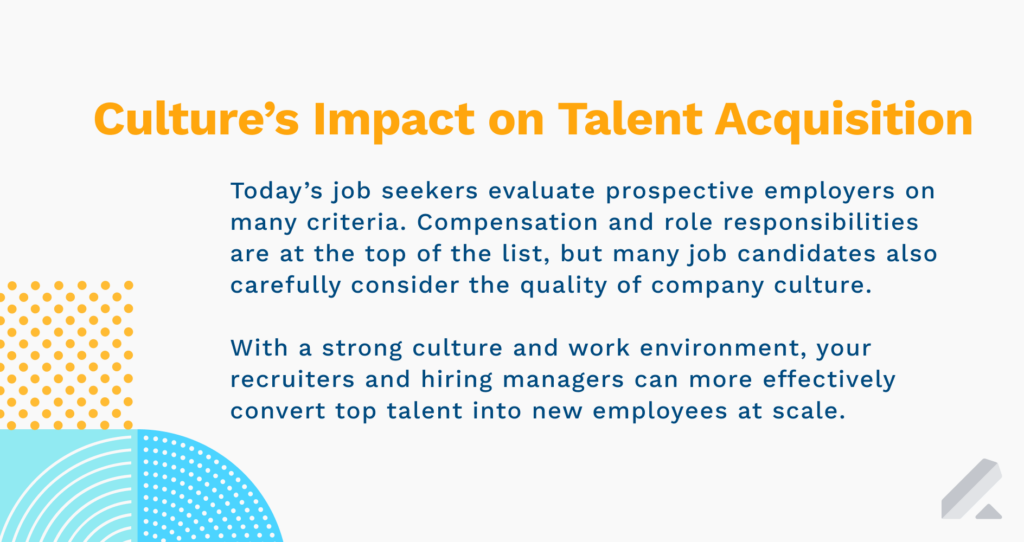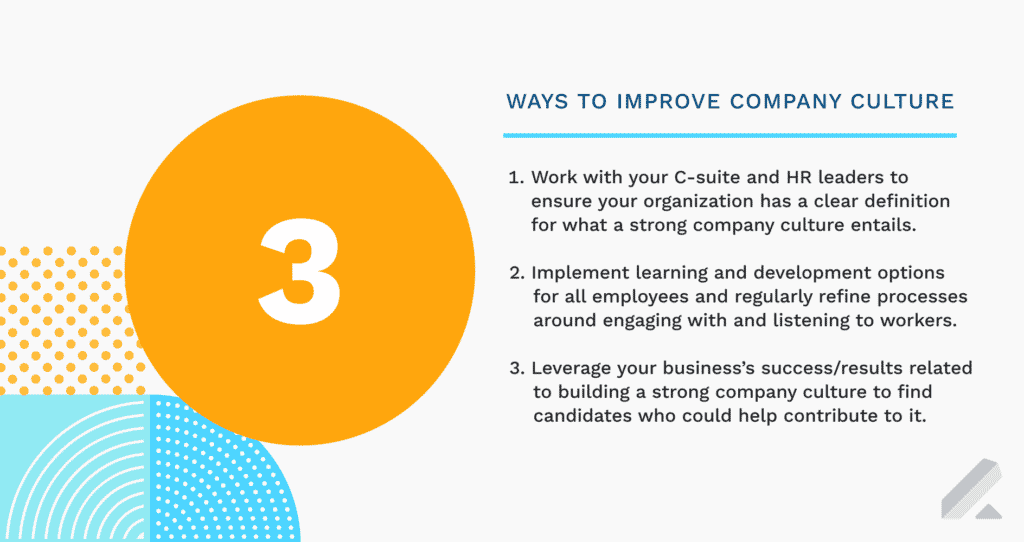It’s clear why company culture is so important to employers of all sizes today:
- A good company culture leads to an enjoyable employee experience, makes workers feel safe and heard, and strengthens the brand reputation to job candidates and customers.
- A bad company culture negatively impacts employee engagement, can take away a sense of belonging and meaningful contribution, and leads to a poor external reputation.
A common thread among organizations with strong corporate cultures is that they prioritize workforce wellness. Doing so leads to greater employee happiness and productivity.
“Finding the right job today remains challenging,” said Indeed Chief People Officer Priscilla Koranteng. “What we know is that people want to work for an employer that puts them first.”
Yet, recent Indeed research found 71% of professionals reported low to moderate well-being at their companies. This poor sentiment means employees feel unsatisfied at work. It also points to problems with these businesses’ cultures that impact talent attraction and retention.
If your company falls into this bucket, it’s time to examine the state of your workforce culture, then make data-backed changes to it so you can hire and keep high-performing employees.

The sizable impact company culture has on talent acquisition and employee retention
“Employers that invest in fostering and maintaining a positive workplace culture can differentiate themselves in a cost-effective way that yields a high return on investment,” SHRM Research Director Kerri Nelson, Ph.D., noted regarding the publication’s latest culture report.
This ROI refers to both talent attraction and retention:
- A strong workforce culture provides your hiring team with helpful talking points. Recruiters and hiring managers can use consistent messaging that clearly describes your culture in job description copy, company profiles on job boards and career communities, social media posts, emails and texts with candidates, interviews, and other stages of the hiring cycle. This can lead to more applications from active job seekers and greater interest from passive candidates.
- A robust corporate culture also helps with boosting your employee retention rate. The more your workforce engages with one another in employee resource groups, brainstorming sessions, and the like, the more likely they are to feel a sense of belonging and want to stay at your company. As long as business leaders “treat culture as a verb, not a noun,” as leadership consultant Al Dea wrote for Fast Company, your organization is likely to see high retention.
- A robust corporate culture also helps with boosting your employee retention rate. The more your workforce engages with one another in employee resource groups, brainstorming sessions, and the like, the more likely they will feel a sense of belonging and want to stay at your company. Leadership consultant Al Dea wrote for Fast Company about how companies are likely to see higher retention as long as business leaders “treat culture as a verb, not a noun.”
Given ongoing economic uncertainty and labor market tightness, retention remains a focal point for many employers today, HR expert Corey Berkey recently wrote for Forbes.
“In times like these, retention must be the name of the game in HR and recruiting,” said Corey. “Success hinges on the ability to not only to meet workers’ needs right now, but also to demonstrate a commitment to keeping your best and brightest for the long run.”
And the best way to retain employees long term and show external candidates what a great place your business is to work for is to constantly analyze and improve your company culture.

How to improve your company culture — and better attract and retain top talent
“Employees are demanding more than just a paycheck,” leadership expert Benjamin Laker wrote for Forbes. “They want to work somewhere that aligns with their beliefs and values.”
Due to this, Benjamin said employers “must demonstrate a clear set of values to stand out from the competition and create an attractive atmosphere” for current and future employees.
Here are some ways your company can enhance your company culture to better attract job seekers looking for new career opportunities and retain members of your existing workforce.
Learn why employees are excited to come to work
Customer service and support teams send Net Promoter Score surveys to customers to get insight into their past experiences with the company, like their purchases.
Human resources teams at many small and scaling businesses now do the same with their workforce. Custom employee surveys are sent to each staff member quarterly.
This helps HR, executives, and managers learn what employees think about the organization, including the culture. Survey results can then be used to strengthen the culture.
For example, if many workers rated your business poorly regarding internal mobility, your leadership can prioritize career advancement and offer upskilling and reskilling opportunities.

Emulate other employers’ organizational cultures
There are many great company culture examples that can inspire your culture transformation. Visit other leading employers’ websites to examine their career sites and about pages.
Here, you can see how they talk about their efforts to improve their work environment, empower employees, and make progress with diversity, equity, and inclusion (DEI) initiatives.
Many companies have “culture code” decks on their sites that detail their long-term focus on culture advancement. Use these to inspire your own approach to an organizational reset.
Walk the walk, in terms of diversity and inclusion
Speaking of DEI, actions speak louder than words. Ensure your DEI programs lead to progress with hiring diverse talent across teams, ensuring fair pay, and realizing an inclusive workplace.
“Candidates today are emboldened more than ever to seek out roles and companies that match their own values,” the 2023 Employ Recruiter Nation Report noted.
“They want a supportive and inclusive workplace culture that affords equal opportunities to each team member and makes people feel included in the success of the business.”
The report found one-quarter (23%) of HR decision-makers plan to increase investment in DEI programs in the years ahead. This is a smart move for many reasons, one being that more and more job seekers want to work for employers that prioritize diversity, equity, and inclusion.
Recognize employee wins on a regular basis
Regular employee recognition goes a long way in proving you care when workers contribute to business growth, even if it’s a minor contribution.
Something as small as sharing praise during a performance review and shining a light on team members for the success of a joint project can do wonders for your company culture and making your staff feel appreciated and seen.
Employee recognition could be a big differentiator for your business, in terms of hiring and retaining talent, given how few companies prioritize it. A recent Gallup/Workhuman study found 81% of executives said “recognition isn’t a major strategic priority of their company.”

What your talent team can do to amplify awareness of your strong company culture
Much of the work above is for your C-suite, people managers, and human resources team.
While they address those facets of your company culture, you can refresh your employer brand messaging and use it in all external promotions of open roles and your business at large.
The top places to get your culture-centric messaging in front of qualified candidates include:
- Your career site. Talent teams with LeverTRM as their recruiting software use our Career Site Builder to develop custom career pages. Here, they can add in their visual brand elements and messaging that highlights their companies’ mission statement, values, and DEI efforts. They can even feature testimonials from employees who can share their unique experiences working for their employer. And, of course, they can feature all job postings for openings across their business.
- Job boards. Lever customers also connect our ATS + CRM solution to job boards where they can publish listings for open roles. Impact descriptions for these available positions can incorporate copy that promotes their company culture so candidates can determine if their business is a strong fit, based on their employer preferences.
- Social media. LinkedIn is the obvious social network where it’s critical to have an employer brand presence. But, don’t forget about other platforms like Facebook and perhaps even Instagram and TikTok, depending on your industry and target audience. Posting videos and graphics on these sites, including those featuring quotes from team members, can shed light on what it’s like to work at your business.
- Nurture campaigns. LeverTRM offers built-in candidate nurturing capabilities. Recruiters can customize our pre-set email templates and create targeted, personalized nurture campaigns to promote job openings and stay top of mind with candidates of interest. Both nurture approaches can include culture-oriented messaging to remind previously engaged candidates what makes your company a top employer.
- Interviews. Digital messaging about your culture is ideal. But, don’t forget to elaborate on your culture during interviews. Your talent team and hiring managers are likely well-versed in promoting your culture. Just remember that interview panelists who don’t speak with job seekers as often as your hiring team will need some training to learn what to say about your employer brand in chats with candidates.
Improving your culture and building a compelling narrative around it doesn’t happen overnight. Key stakeholders company-wide must work closely with one another to tackle the two tasks.
Once both are addressed, your talent team and hiring managers can more effectively:
- Position your business to potential candidates
- Add more premier prospects to your talent pool
- Hire strong-fit job seekers who are culture-adds
Just be sure you have the right tech to enable your TA team to execute the above activities so they can move candidates from interview to offer as quickly and efficiently as possible.
Learn how you can use LeverTRM to showcase your work culture and team members on your career site and in other recruitment marketing efforts. Schedule a demo today.



